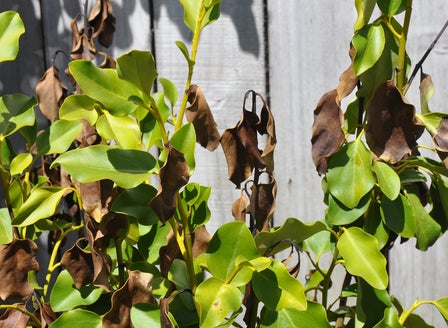What simpler pleasure is there than growing and picking your own home-grown avocado.
Planting Calendar
Avocados are best planted from early August through until the end of October.
Harvest In
3 - 6 Years
Avocados will be ready to harvest between 3 to 6 years after planting, depending on the variety, soil structure and care they receive. Though patience is needed to grow avocados, a seven year old tree will produce approximately 200 avocados in a season. Harvest times vary between varieties also. Research when your variety is ready to harvest.
Prepare
Position
Avocado trees need to be planted in full sun with some protection from frost and wind. If planting cleopatra, the dwarf variety, into a pot, ensure that the pot is at least 50cm x 50cm
Soil
Plant in well-draining soil rich in organic matter. Avocados have sensitive roots and don’t cope well in compact soils. When planting dwarf types into a large pot plant into Kings Container Mix.
Pollination
While some avocado trees will self-pollinate, it is recommended that you have a type A and a type B for better pollination and fruit production. Avocados are split up into two pollinating categories. Type ‘A’ and type ‘B’. These types are divided up by the different opening times of the male and female flowers. Type ‘A’ avocado’s female flowers open in the morning for 2 – 3 hours before closing, then their male flowers open later in the afternoon for 2 – 3 hours before closing. Type A varieties include Hass and Reed. Type ‘B’ pollinators are the opposite, where the females are open in the afternoon and males in the morning making these two types a perfect match. Type B varieties include Cleopatra, Bacon, Hashimoto and Fuerte.
Plant
Gently remove your plant from its bag, make sure you do not damage any roots as Avocado are very sensitive to root damage. Dig a hole twice the depth and width of the plants root ball. Mix together Kings Compost, Sheep Pellets and Kings Natures Own Organic Fertiliser into your existing soil. Back fill the hole with this soil, so that when planted the top of the plant’s roots sit level with the surrounding ground. Firm the soil down gently and water in well with Aquaticus Garden Booster. In heavier clay soils, where drainage is likely to be an issue, plant onto a raised mound and sprinkle Gypsum Clay Breaker into the bottom of the hole, this helps slowly condition the soil and help to break down the clay.
Care
Watering
Water your tree deeply once established, leave the hose on a slow flow for around 10 minutes for each tree so that the water can sink down into the soil and roots. Watering this way twice a week is much better than a small amount of water every day.
Feeding
Feed monthly through Spring and Summer with Aquaticus Organic Garden Booster. Once flowers and fruit emerge, feed with Kings Citrus and Fruit Tree Fertiliser as per the instructions on the packet.
Protecting
Young avocado trees need to be sheltered from strong wind and frosts for the first couple of years after planting. Use frost cloth and wind-break to help protect them during this period.
Mulching
Mulch regularly with Living Earth More than Mulch, making sure the mulch is not touching the trunk.
General Care
When using sprays, chemicals or fertilisers always read the label and follow the instructions. Apply sprays in the evening to avoid harming beneficial insects.
Beginner Tip
Ensure that you protect your tree from frost while still young.
Expert Tip
If your avocado is flowering in temperatures under 20 degrees, the flowering times will become irregular, impacting pollination, and therefore fruit production. If your neighbour is also interested in getting an avocado, recommend the opposite pollination variety to yours so you can both benefit from cross pollination (they don't need to be right next to each other)!
Tip
Store avocados at room temperature, keeping in mind that they can take 4-5 days to ripen. To speed up the ripening process, put them in a paper bag along with an apple or banana. When the outside skins are black or dark purple and yield to gentle pressure, they’re ready to eat or refrigerate.
Top Varieties
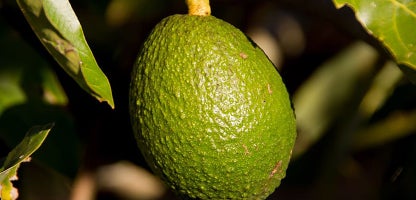
Hass
Hass - Is a A type variety and easily the most common avocado. Medium sized fruits are nutty in flavour. Matures Nov-Mar. Leave to darken and soften before eating.
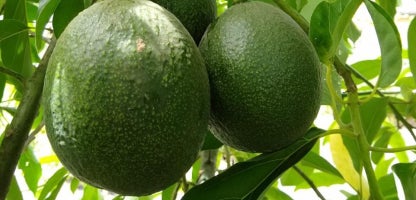
Reed
Reed - A smaller growing A type variety well suited to the home garden. Large round smooth fruits are buttery and very tasty. Matures Feb-Apr. Eat when green and soft.
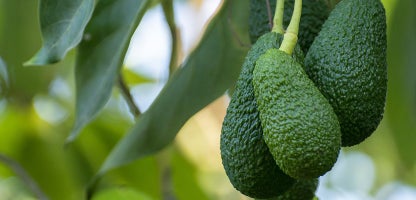
Fuerte
Fuerte - Is a B type Variety with long oval pear shape with mild taste and leathery green skins. Matures Aug-Oct. Eat when green and soft.
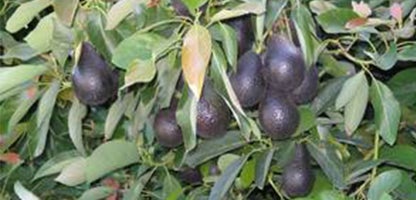
Cleopatra
Cleopatra- Is a dwarf B type variety that is suited to being grown in a large pot or ideal for smaller urban gardens. It produces medium sized pear shaped fruit with shiny skin. Skin turns black on the tree prior to harvest
Frequently Asked Questions
How can I tell if avocados are ripe?
Hass avocados are ready once their skin becomes a purple brown in colour.
Why isn’t my avocado tree producing fruit?
Avocados trees grown from seeds can take up to 12 years to start producing fruit. There are many environmental reasons that trees may stop producing fruit such as dry soil, root rot and pruning faults.
When should I pick my avocados?
Avocados are do not ripen on the tree, they only ripen once they have been picked. If picked prior to maturity, avocados will not ripen, and they will remain hard. The easiest way to discover whether your avocados are ready is to pick one, and if it ripens within two weeks then all should be ready for picking. Check every couple of weeks if it doesn't ripen. Harvesting season for New Zealand's most common variety of avocado, Hass avocados is September to April.
Is an avocado a fruit or a vegetable?
Avocado is actually a fruit, specifically a berry. It contains around 20 nutrients, is naturally low in sugar and contains protein, making it one of the healthiest fruits.
